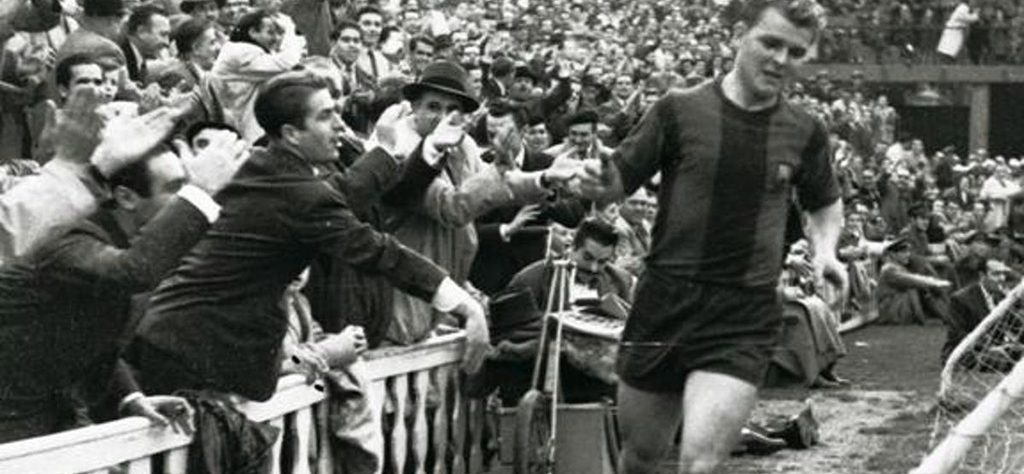Today is the 95th anniversary of the birth of the great player Ladislao Kubala, one of the fundamental men for Barcelona, a man whose name simply must be known by a self-respecting “blaugrana”. On the birthday of the legend, who left us exactly 20 years ago, we remember him… On May 4, 1949, the plane carrying the Torino team in its entirety crashed on approach to Turin but it lost its bearings in a foggy environment. It was returning from a friendly against Benfica in Lisbon. It was supposed to have a deserted Ladislao Kubala on board. He should have been, but… He was dissuaded from flying by his pregnant wife, who asked him to stay and be with her. Ladislau (then – or Ladislav, or Laszlo), always a caring husband, could not offend his wife. As it turned out later – to his happiness. Although he agreed with her, grudgingly – it seemed that fate threw him a fabulous chance. “Torino was then considered the best team in Europe, to be in its squad was a huge success. All the more so for Kubala, who seemed to have been cut out of normal soccer life. Hungarian by father, Slovak by mother, he played for both the Czechoslovakian and Hungarian national teams. And lived in both countries. And played for local clubs. In the end he ended up in Hungary, but he did not fit into the life of a country that was rapidly communizing. There he was suspected of spying for Czechoslovakia and was “enlisted” in the army. So Kubala decided to flee. This is a story for a detective story of its own – how, disguised in Soviet military uniform, he crossed the Austrian border in the back of a truck, with his mother, wife and one-year-old son lying under a tarpaulin. As later in Vienna, they had to live in a lodging house and no soccer prospects loomed, and it seemed that there was no reason to dream of a career as a player. But after all, Kubala was a great talent and he could not fade into oblivion. And he didn’t. The problem was that he had no right to play. The Hungarian Football Federation disqualified him for life after his escape, and FIFA approved the decision. But several Italian clubs got in touch with him and offered to sign him a contract, and then, maybe, with their efforts, things will somehow get better – FIFA will reduce the period of disqualification or something else good will happen. After all, after the Torino disaster, Kubala signed a contract with Pro Patria, but what’s the use? FIFA’s position didn’t change, he couldn’t play. “We’ll go the other way!” – Kubala said then – and created a soccer world outside of FIFA. A small one, true, but of very high quality. From refugees and refuseniks, mostly of Hungarian origin, he made a team, which he called Hungaria. He found a coach in the person of his father-in-law, the Slovak Ferdinand Daucek. He bought a second-hand bus in a pool with everyone who could give him money. Wrote Magic Bus on it. And started touring with his “Hungaria. “Kubala’s Magic Bus visited several countries, the team was strong, the games resonated because the opponents were of high status. That’s how he killed two birds with one stone – provided himself and his friends with playing practice and introduced his soccer talent to Europe. That’s what formed his life’s work. In June 1950, “Hungaria” stopped by Spain. Several matches were held there that deeply impressed the local public – and they really knew a lot about soccer! The first two games – the win over Real Madrid (4-2) and Spain (2-1) – caused a particular stir. Kubala scored goals in both games. After that he was offered to stay in Spain and quickly applied for citizenship. Immediately, there was a request to FIFA to have the period of his suspension reduced. In the end it was done, and in April 1951 he could already play full soccer. He was offered a contract by Real Madrid but he chose Barcelona. Why? “Because I like the uniform with the stripes,” Kubala joked when he was asked this question. Perhaps he was simply attracted to the Catalan style, which is more combinative than that of Madrid. Either way, Kubala became a Barça player and grew into a club legend in a matter of months. What followed was fame and adoration. He spent 10 seasons at Barcelona, scored 131 goals, and was part of one of the best squads in its history – his compatriots Zoltán Cibor and Sándor Kocís (both knighted by Kubala after the fateful 1956), as well as the Brazilian Evaristo and the Spaniard Luis Suárez played in the attack. What a company it was! At the end of the 50s, only Santiago Bernabeu’s Galacticos – Alfredo Di Stefano and his Real Madrid partners – could compare with it. Kubala was combative and technical, inventive and determined. He went down in the club’s history as one of the best (if not the best) free kick shooters – they say even Ronald Koeman can rest beside him. He had the perfect eye for goal. He was excellent both at the cutting edge of the attack and a little deeper, in the ‘ten’ position, where fate and age had moved him. He was twice champion of Spain in the early 50′s, and then, after a change of generations in the team – twice more at the end of the decade. When he was buried in May 2002, a procession of many thousands passed through the city of Barcelona. Somewhere in it, the 14-year-old Lionel Messi must have walked…
